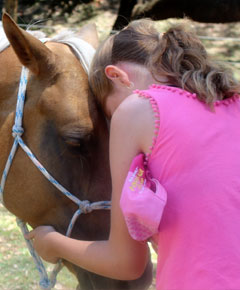
EAGALA Equine Assisted Psychotherapy (EAP)
Research shows horses add a compelling dimension to the clinical experience. They serve as powerful living metaphors and stand-ins for the challenges and opportunities clients face in their lives. A client who has trouble managing anger, for example, can only learn so much by talking about it out of context in a therapist’s office. Progress can be slow and results hard to sustain. But when the client has the opportunity to practice new coping skills with 500kg herd animals whose survival depends on their ability to read and react to the inner turmoil of those around them, experience leads to change because the process is real, practical and sustainable. In the right professional hands, using a proven professional model, horses as the guides have the power to help clients practice new ways of engaging with the world without judgement or shame.
SESSION OBJECTIVES
Individuals gain awareness and insight into better ways of living through the way in which the horse reflects information back to them. Working with horses supports and encourages the identification and expression of feelings and thoughts. Interventions or activities are planned around the concept of the horse’s reflective behaviour, and are tailored to each individual and their assessed needs. The use of horses in the treatment of a multitude of psychological issues relieves emotional and psychological distress and changes destructive patterns of behaviour.
Other Benefits
Education and practical application of critical skill sets, including:
- Communication
- Emotional Regulation
- Management of Anger
- Exploring possibilities
- Increased curiosity and sense of vitality.
- Increase in co-operative practises and decrease in competition
- Co-constructing “better” ways
- Improved working relations/conflict resolution
- Mindfulness
The non-traditional environment creates possibility for new interaction: “It doesn’t feel like counselling”
Equine Assisted Psychotherapy Facts
- Clients find EAP more interesting than talk therapy
- EAP keeps clients on task and engaged
- Environment is less threatening for clients to experience the benefits of working with a therapist
- Clients are more willing to attend sessions and interact in the process
- The horses provide immediate feedback on which behaviours work and which don’t
- The sessions create metaphors that illuminate situations encountered in life to help make changes in attitude as well as behaviour
- The horses provide emotional support and bonds that are helpful in the therapy process
- The sessions help both clients and therapists identify issues much more quickly
- The sessions provide clients the ability to express and communicate in ways that traditional therapies don’t
SESSION OUTLINE
- A collaborative effort between a mental health professional and a horse specialist working with clients and horses to explore identified objectives
- A solution-focussed model of change
- Use of therapeutic metaphor to look at perceived limitations
- Facilitate cognitive restructuring through experiential learning
- Encourage behavioural practice
- Provide opportunities for participant/s to learn about themselves and others by participating in activities with the horses, and then processing (or discussing) feelings, behaviours, and patterns
- 1 hour sessions. 10 sessions are recommended then review.
SESSION OUTCOMES
- Decrease of Intrapersonal Distress
- Decrease of Somatic Distress
- Cooperative Interpersonal Demeanour
- Absence of Critical Items
- Decrease in Social Problematic Behaviours
- Decrease in Maladaptive Behaviour and Coping Strategies
- Increased awareness of emotional states
- Increased self-esteem and body awareness
- Increased awareness of thought processes
- Increased Resilience
- Increased understanding of the process of rupture and repair in relationships
SERVICES AVAILABLE
- Individual Counselling
- Family Counselling
- Couples Counselling
- Group Counselling
EAP assists individuals with co-constructing alternative ways of living to address:
- Anger
- Anxiety
- Asperger’s Disorders
- Attachment Disorders
- Social and Behavioural Disorders (ODD ADHD)
- Behavioural Issues
- Bullying
- Child Abuse / Neglect
- Communication Issues
- Depression
- Divorce / Absent Parents
- Domestic Violence
- Eating Disorders
- Grief
- Issues Related to Truancy
- Lack of Direction
- Learning Difficulties
- Low Self-esteem
- Poor Social Skills
- Post-Traumatic Stress Disorder
- Relationship Issues
- Self Harm – Self Injury
- Substance Abuse
- Suicide Ideation
- Trauma

At HORSEACCORD we use the EAGALA Model of Equine Assisted Psychotherapy and Personal Development


“There is something about the outside of a horse that is good for the inside of a man.”
Winston Churchill
